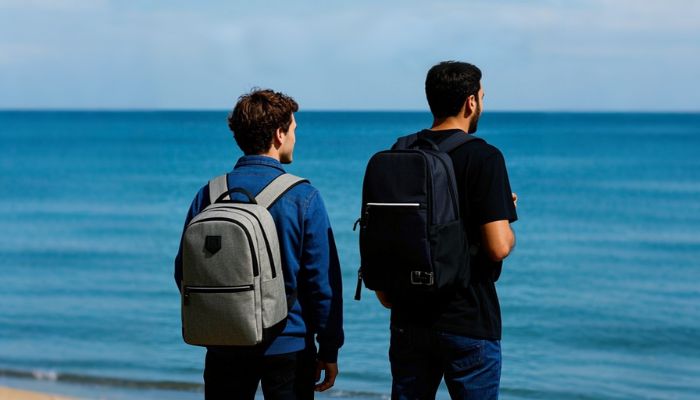
In the world of laptop backpacks, size is a crucial factor that often gets overlooked when it comes to comfort. Whether you’re a student lugging books and a laptop around campus, a professional commuting to work, or a traveler exploring new destinations, the size of your laptop backpack can make or break your comfort level. In this blog post, we’ll delve into the significance of backpack size and how it impacts your overall comfort during use.
1. The Right Fit for Your Laptop
The most fundamental aspect related to the size of a laptop backpack is its ability to accommodate your laptop properly. Laptops come in various sizes, from compact 11-inch models to larger 17-inch gaming laptops. A backpack with a laptop compartment that’s too small will force the computer to fit snugly, increasing the risk of damage due to pressure or a lack of cushioning. On the other hand, an overly large compartment may cause the laptop to shift around during movement, posing a safety threat.
For example, you might have to squeeze the laptop in if you have a 15-inch laptop and the backpack’s laptop sleeve is designed for a 13-inch model. This could lead to scratches on the laptop’s surface or even damage to the internal components over time. Conversely, if the sleeve is too big and doesn’t have proper restraints, the laptop could bounce around when you’re walking, running for a bus, or climbing stairs.
A well-sized laptop compartment should have a snug fit with just enough room for the laptop to slide in and out easily. It should also have sufficient padding around the edges to protect the laptop from bumps and shocks. Some high-end backpacks even have adjustable straps or dividers within the laptop compartment to ensure a customized fit for different laptop sizes.
2. Capacity for Other Essentials
Beyond the laptop, the size of the backpack determines how much other stuff you can carry. If you’re a student, you might need to carry textbooks, notebooks, stationery, a water bottle, and a snack. A professional might need to fit in a laptop charger, a mouse, documents, and perhaps a change of clothes for after-work activities.
A backpack that’s too small will force you to leave out essential items or cram them in, making it difficult to access them and causing discomfort. You might end up with a bulging backpack that puts unnecessary strain on the seams and zippers. On the other hand, an oversized backpack might tempt you to overpack, leading to a heavy load that’s uncomfortable to carry.
For instance, imagine trying to fit a week’s worth of gym clothes, running shoes, a laptop, and work documents into a small day-pack. It’s simply not going to work. You’ll either have to sacrifice some items or struggle to close the backpack. In contrast, a large backpack with more than enough room can make it easier to organize your things. There could be separate compartments for different categories of items, like a padded section for electronics, a mesh pocket for a water bottle, and a large main compartment for clothes or books.
3. Proportions and Body Fit
The size of the backpack your body size and shape also play a vital role in comfort. A backpack that’s too wide or too long for your body can throw off your balance and put extra strain on your back and shoulders. The straps might not sit correctly, causing them to dig into your shoulders or slide off constantly.
If you’re petite, a large, bulky backpack can make you look and feel top-heavy. The weight of the backpack will be distributed unevenly, with more pressure on your upper back and neck. On the other hand, a very small backpack on a larger person might not have enough space to carry all the necessary items without overstuffing, and the straps might be too short to adjust for a comfortable fit.
Ideally, the backpack should sit comfortably on your back, with the bottom of the pack resting just above your waist. The straps should be adjustable to fit snugly around your shoulders without being too tight or too loose. Some backpacks come with additional features like a chest strap or a waist belt to help distribute the weight more evenly and keep the backpack in place.
4. Impact on Posture and Back Health
The size of the laptop backpack directly affects your posture and back health. A backpack that’s too heavy due to overpacking (which can be exacerbated by a large-sized backpack) can cause you to hunch forward to counterbalance the weight. This poor posture can lead to back pain, neck pain, and even long-term spinal problems.
If the backpack is too small and you have to carry a lot of items, you might end up carrying additional bags or holding things in your hands. This can also lead to an asymmetrical load, putting more strain on one side of your body. A well-sized backpack, on the other hand, allows you to carry your essentials in an organized manner, with the weight evenly distributed across your back and shoulders.
For example, if you’re constantly carrying a small backpack that’s overflowing with items, you might develop a habit of leaning to one side to relieve the pressure on your shoulder. Over time, this can cause muscle imbalances and postural issues. A properly sized backpack with a good carrying system can help you maintain a healthy upright posture and reduce the risk of back-related problems.
5. Comfort in Different Environments
The size of the backpack also matters in different environments. In a crowded subway or a busy airport, a large backpack can be a hindrance. It might bump into other people or get caught in tight spaces. On the other hand, a very small backpack might not provide enough protection for your laptop and other valuables in a more rugged outdoor environment.
For outdoor enthusiasts, a medium-sized backpack with a durable exterior and enough room for essentials like a rain jacket, a first-aid kit, and a water purification system is ideal. In an urban setting, a more compact backpack that can hold a laptop, a wallet, and a few personal items might be more suitable for quick commutes or short outings.
6. Conclusion
In conclusion, the size of a laptop backpack is of utmost importance when it comes to comfort. It affects everything from the safety of your laptop to your body’s posture, the amount of items you can carry, and your overall ease of movement in different environments. When choosing a laptop backpack, it’s essential to consider your specific needs, the size of your laptop, and your body size and shape. By taking the time to find a backpack with the right size, you’ll ensure a more comfortable and enjoyable experience, whether you’re traveling, studying, or working.



